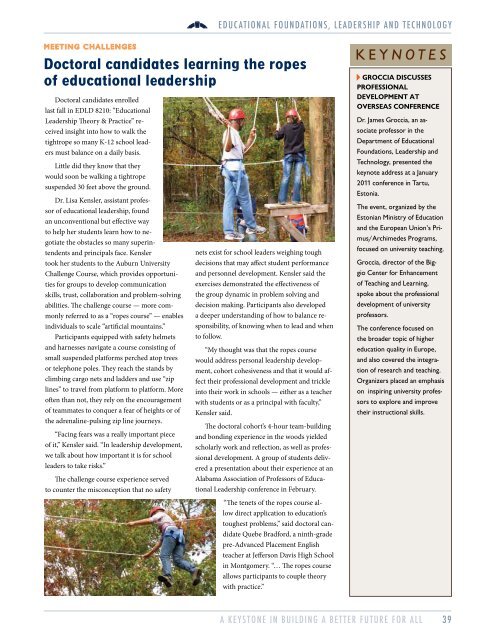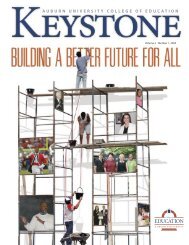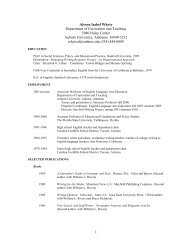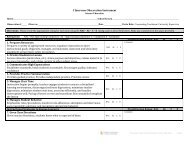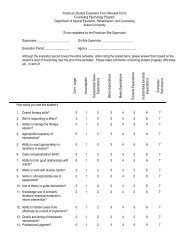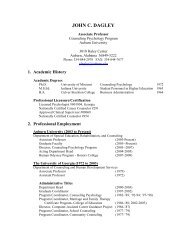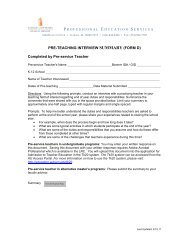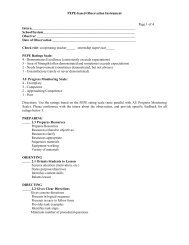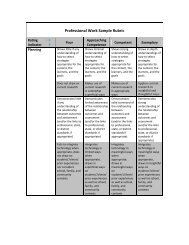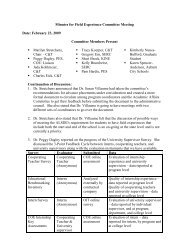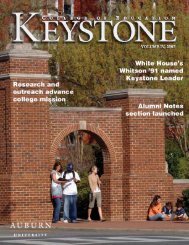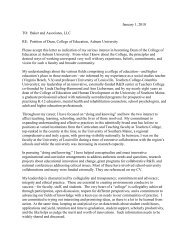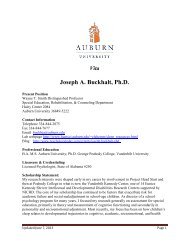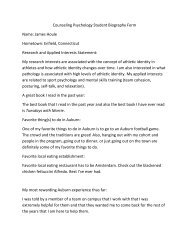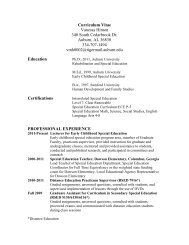8.1MB - College of Education - Auburn University
8.1MB - College of Education - Auburn University
8.1MB - College of Education - Auburn University
Create successful ePaper yourself
Turn your PDF publications into a flip-book with our unique Google optimized e-Paper software.
E d u c at i o n a l F o u n d at i o n s , L e a d e r s h i p a n d T e c h n o l o g y<br />
M e e t i n g c h a l l e n g e s<br />
Doctoral candidates learning the ropes<br />
<strong>of</strong> educational leadership<br />
Doctoral candidates enrolled<br />
last fall in EDLD 8210: “<strong>Education</strong>al<br />
Leadership Theory & Practice” received<br />
insight into how to walk the<br />
tightrope so many K-12 school leaders<br />
must balance on a daily basis.<br />
Little did they know that they<br />
would soon be walking a tightrope<br />
suspended 30 feet above the ground.<br />
Dr. Lisa Kensler, assistant pr<strong>of</strong>essor<br />
<strong>of</strong> educational leadership, found<br />
an unconventional but effective way<br />
to help her students learn how to negotiate<br />
the obstacles so many superintendents<br />
and principals face. Kensler<br />
took her students to the <strong>Auburn</strong> <strong>University</strong><br />
Challenge Course, which provides opportunities<br />
for groups to develop communication<br />
skills, trust, collaboration and problem-solving<br />
abilities. The challenge course — more commonly<br />
referred to as a “ropes course” — enables<br />
individuals to scale “artificial mountains.’’<br />
Participants equipped with safety helmets<br />
and harnesses navigate a course consisting <strong>of</strong><br />
small suspended platforms perched atop trees<br />
or telephone poles. They reach the stands by<br />
climbing cargo nets and ladders and use “zip<br />
lines’’ to travel from platform to platform. More<br />
<strong>of</strong>ten than not, they rely on the encouragement<br />
<strong>of</strong> teammates to conquer a fear <strong>of</strong> heights or <strong>of</strong><br />
the adrenaline-pulsing zip line journeys.<br />
“Facing fears was a really important piece<br />
<strong>of</strong> it,” Kensler said. “In leadership development,<br />
we talk about how important it is for school<br />
leaders to take risks.”<br />
The challenge course experience served<br />
to counter the misconception that no safety<br />
nets exist for school leaders weighing tough<br />
decisions that may affect student performance<br />
and personnel development. Kensler said the<br />
exercises demonstrated the effectiveness <strong>of</strong><br />
the group dynamic in problem solving and<br />
decision making. Participants also developed<br />
a deeper understanding <strong>of</strong> how to balance responsibility,<br />
<strong>of</strong> knowing when to lead and when<br />
to follow.<br />
“My thought was that the ropes course<br />
would address personal leadership development,<br />
cohort cohesiveness and that it would affect<br />
their pr<strong>of</strong>essional development and trickle<br />
into their work in schools — either as a teacher<br />
with students or as a principal with faculty,”<br />
Kensler said.<br />
The doctoral cohort’s 4-hour team-building<br />
and bonding experience in the woods yielded<br />
scholarly work and reflection, as well as pr<strong>of</strong>essional<br />
development. A group <strong>of</strong> students delivered<br />
a presentation about their experience at an<br />
Alabama Association <strong>of</strong> Pr<strong>of</strong>essors <strong>of</strong> <strong>Education</strong>al<br />
Leadership conference in February.<br />
“The tenets <strong>of</strong> the ropes course allow<br />
direct application to education’s<br />
toughest problems,” said doctoral candidate<br />
Quebe Bradford, a ninth-grade<br />
pre-Advanced Placement English<br />
teacher at Jefferson Davis High School<br />
in Montgomery. “… The ropes course<br />
allows participants to couple theory<br />
with practice.”<br />
K E Y N O T E S<br />
Groccia discusses<br />
pr<strong>of</strong>essional<br />
development at<br />
overseas conference<br />
Dr. James Groccia, an associate<br />
pr<strong>of</strong>essor in the<br />
Department <strong>of</strong> <strong>Education</strong>al<br />
Foundations, Leadership and<br />
Technology, presented the<br />
keynote address at a January<br />
2011 conference in Tartu,<br />
Estonia.<br />
The event, organized by the<br />
Estonian Ministry <strong>of</strong> <strong>Education</strong><br />
and the European Union’s Primus/Archimedes<br />
Programs,<br />
focused on university teaching.<br />
Groccia, director <strong>of</strong> the Biggio<br />
Center for Enhancement<br />
<strong>of</strong> Teaching and Learning,<br />
spoke about the pr<strong>of</strong>essional<br />
development <strong>of</strong> university<br />
pr<strong>of</strong>essors.<br />
The conference focused on<br />
the broader topic <strong>of</strong> higher<br />
education quality in Europe,<br />
and also covered the integration<br />
<strong>of</strong> research and teaching.<br />
Organizers placed an emphasis<br />
on inspiring university pr<strong>of</strong>essors<br />
to explore and improve<br />
their instructional skills.<br />
A K e y s t o n e i n B u i l d i n g a B e t t e r F u t u r e f o r A l l 3 9


